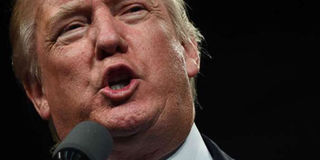Lessons for Kenya from the Clinton-Trump clash

US Republican presidential nominee Donald Trump speaks during a campaign rally at the Suburban Collection Showplace in Novi, Michigan in the US on September 30, 2016. PHOTO | JEWEL SAMAD | AFP
What you need to know:
A strong democracy underpinned by the rule of law and strong institutional frameworks should be able to survive anything that angry, selfish, divisive politicians may incite.
- This is the kind of democracy we must seek to build if Kenya is not to be forever at the mercy of Uhuru Kenyatta, William Ruto, Raila Odinga or other ethnic chieftains forever turning us against one another.
It was fascinating watching on Monday morning the second of the US presidential election debates featuring Democratic Party candidate Hillary Clinton against Republican Party rival Donald Trump.
Usually it is only something of global importance like the football World Cup or the Olympic Games that can get me up at the ungodly hour of 4am to switch on the television, and the presidential election in far-off United States now earns that rating.
The second debate was particularly awaited because of the maelstrom surrounding Mr Trump after leaked video tapes surfaced of his controversial conversations on women.
With the Republican tycoon promising to respond in kind and turn the focus to the well-known sexual indiscretions of Mrs Clinton’s husband, former President Bill Clinton, the debate promised fireworks.
Well, there was no nuclear meltdown. The two candidates took pretty harsh jabs at each other and it often became mean, nasty, and personal, but by and large the moderators managed to steer the debate towards competing policy proposals.
There were no threats to violence, no fears that the US is headed towards ethnic strife, internal implosion, or civil war.
There must be a lesson in there for us. This is clearly one of the most divisive and bitter American presidential elections. The real estate and casino mogul and reality TV star popularly known just as “The Donald” has brought world attention to the US presidential campaign since his surprise capture of the Republican nomination.
DIVIDED PARTY
His controversial views and policy proposals have divided his own party and exposed the deep-seated fissures in American society that he has deliberately exploited.
The divisions, the anger, and the fears that today define the most powerful country in the world have been brought powerfully to the global stage, to the extent that it sometimes seems the rest of us have a direct stake, if not a vote, in the US election.
All of us might have reason to feel that we will be affected by the outcome. The winner will come to impact not just domestic policy, but also the global stage where US leadership is still critically required on the issues of the day, ranging from economics, trade agreements, multilateral organisations, and of course international security and terrorist threat.
Mr Trump promises to shake things up, but the truth is that populist rhetoric that taps into the fears and insecurities of the uneducated white American male would not automatically be translated into policies that change America and the world.
A President Trump, God forbid, would find early on that his room for manoeuvre is limited. The United States is built on laws that do not allow the emergence of tyrants and dictators.
He would not be able to throw his opponents into jail, declare war on ethnic or religious groups, or carry out mass expulsion of population groups that he does not like.
EXECUTIVE FIAT
No American president will have the power to shape economic and social policy by executive fiat.
On the international stage, he would not have the leeway to take unilateral actions such as launching nuclear strikes against regimes or groups he identifies as enemies.
The US has established checks and balances, respected conventions and precedents, as well as the laws and institutions that all serve to ensure that a presidential election is not a do-or-die affair.
The campaigns can indeed get bitter and divisive, and there are legitimate fears when candidates like Trump head a major party ticket and demonstrate that extremist views are going mainstream.
But still, it is not as if the US is headed towards destruction. A strong democracy underpinned by the rule of law and strong institutional frameworks should be able to survive anything that angry, selfish, divisive politicians may incite.
That is the kind of democracy we must seek to build if Kenya is not to be forever at the mercy of President Uhuru Kenyatta, Deputy President William Ruto, opposition leader Raila Odinga, or other ethnic chieftains forever turning us against one another.
It is only when ideology, policy, and programmes take precedence over ethnic mobilisation and incitement that we will truly be on the road to peace, stability, and prosperity.
These are, therefore, the standards that we must demand of those seeking our votes.
[email protected]; @MachariaGaitho





